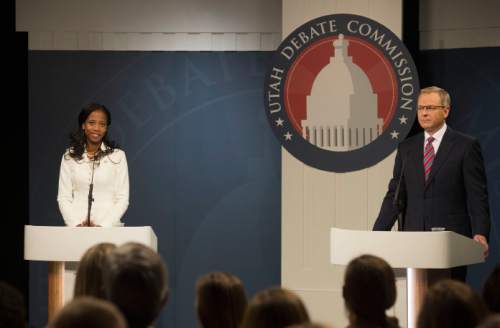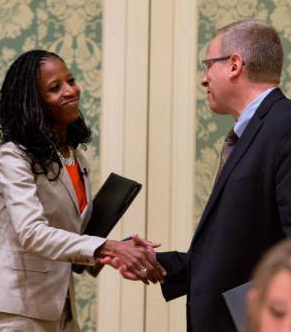This is an archived article that was published on sltrib.com in 2014, and information in the article may be outdated. It is provided only for personal research purposes and may not be reprinted.
A new poll conducted by Brigham Young University says the 4th Congressional District race is a statistical tie between Republican Mia Love and Democrat Doug Owens, a stunning result that could shake up the contest in its final days.
The poll, released Monday morning, has a different methodology than those commissioned by the candidates in that it includes the opinion of 236 voters responding to an email from Oct. 15 to Oct. 22. They were selected because they participated in BYU's college exit poll in past years, rather than calling likely 2014 voters.
Of that group, 45.8 percent, or 108 people, favor Owens and 42.2 percent, or 100 people, back Love, making this the first time the Democrat has been in the lead in any poll this year. The pollsters consider it a tie because of the chance of statistical error, which they put at a little more than 6 percentage points.
"It is exciting," said Owens, a corporate defense attorney. "I really felt like we have been creeping up from behind."
Love's campaign manager, Dave Hansen, said the results don't match the campaign's internal numbers.
"I don't believe it, to be honest with you," he said. "It is certainly not what we are seeing."
—
Poll perspectives • Hansen is a co-owner of Y2 Analytics, which is conducting daily tracking polls for the Love campaign. His partners are Quin Monson and Kelly Patterson, BYU professors who designed the college's exit polls and the email survey that led to Monday's results.
Monson, declined to comment on BYU's poll, but did offer insights into Love's tracking numbers. He said Love's team saw a similar tightening of the race two weeks ago, though he would not provide specific numbers. He said Love regained the advantage last week. Y2 Analytics is conducting 75 phone surveys a night and aggregated for a week. This tracking shows Love at 45 percent and Owens at 35 percent. Monson echoed a line Owens has been using — that when voters get to know the Democratic candidate, they tend to like him.
"It is a lot closer than it was back in September," he said, "but she is clearly doing OK still."
Hansen took issue with how the poll was conducted. BYU's team sent nearly 7,000 emails to past exit-poll participants and collected the results of roughly 800 completed surveys, a little more than a fourth of which were in the state's 4th District.
Hansen argues the methodology is not scientifically sound.
"I just don't think it has any credibility," he said.
Chris Karpowitz, the co-director for BYU's Center for the Study of Elections and Democracy, defended the results.
"This is one indicator," he said. "It is not the definitive word here, but we have done these sorts of polls in the past and we feel confident."
Karpowitz and the political scientists behind the poll acknowledge the participants are self-selected and may not be random. They also said they weighted the results in hopes of limiting any over-representation of people more likely to respond to emailed surveys, a group that tends to include more men, younger people, people with high incomes and people with a higher educational attainment.
The BYU pollsters, through the UtahDatapoints.com website, also noted the partisan makeup of the electorate may be different this year and that their poll probably understates the role independents may play in this race.
—
Close race • All that said, this is a poll that bolsters Owens' argument that he is within striking distance of Love, the former mayor of Saratoga Springs.
"Despite Mia Love's considerable fundraising and name-recognition advantage, this poll should be read as an indicator that the race is still competitive," Karpowitz wrote. "We do not see Love or Owens with a significant lead."
Love, who lost to Rep. Jim Matheson in 2012 by 768 votes, has been the clear front-runner in every other poll released publicly this year, including one unveiled by Owens that found her up by 3 percentage points, and an independent poll conducted for UtahPolicy.com that had Love up by 9 percentage points.
The BYU poll also included Utah's other three congressional contests and none of them was nearly as competitive, or received as many responses.
In the 1st District, Rep. Rob Bishop had a 49.1 percent to 30.8 percent lead over Democrat Donna McAleer.
In the 2nd District, Rep. Chris Stewart, the Republican, is beating state Sen. Luz Robles, the Democrat, 43.3 percent to 36.7 percent.
In the 3rd District, Rep. Jason Chaffetz is dominating Brian Wonnacott, his Democratic challenger, 59 percent to 24.9 percent. In these three contests, about 15 percent of the respondents said they didn't know whom they would support.





